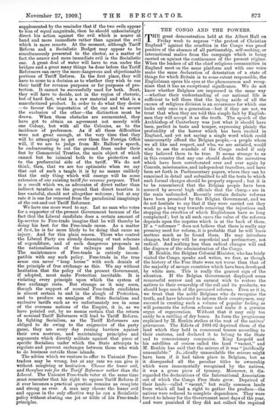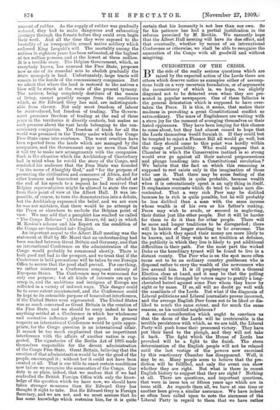THE CONGO AND THE POWERS. T HE great demonstration held at
the Albert Hall on Friday week to express " the protest of Christian England " against the cruelties in the Congo was proof positive of the absence of all partisanship, self-seeking, or international malice from the campaign which is being carried on against the continuance of the present regime. When the leaders of all the chief religious communities in England meet on the same platform and with one voice make the same declaration of detestation of a state of things for which Britain is to some extent responsible, the Englishman opens his eyes at the phenomenon and recog- nises that it has an exceptional significance. We do not know whether Belgians are impressed in the same way —whether their understanding of our national life is sufficient to tell them that the laying aside of all the causes of religious division is an occurrence for which one looks only once in a generation—but if they are not, we trust that when they are told this simple fact by English- men they will accept it as the truth. The speech of the Archbishop of Canterbury was just what it should have been, perfect in taste and temper, expressing plainly the profundity of the horror which has been excited in England, and yet not saying a single word which could unnecessarily offend the Belgian people,—a people whom we all like and respect, and who, we are satisfied, would wish to see the scandals of the Congo ended if only they believed them to be true. It seems strange to us in this country that any one should doubt the narratives which have been corroborated over and over again by Consuls, missionaries, and independent travellers, and have been set forth in Parliamentary papers, where they can b3 examined in detail and submitted to all the tests to which such formal charges should be properly exposed ; but it is to be remembered that the Belgian people have been assured by several high officials that the charge.; are in the main unfounded. Recently certain definite reforms have been promised by the Belgian Government, and we do not hesitate to say that if they were carried out they would go a long way towards removing the injustices and stopping the cruelties of which Englishmen have so long complaineci; but in all such cases the value of the reforms depends upon the impetus which is at the back of them. If a " reformer " does not believe that there is really any pressing need for reform, it is probable that he will leave matters much as ho found them. He may introduce changes, but they will be superficial and perfunctory, not radical. And nothing less than radical changes will end the disgrace of the administration of the Congo.
M. Renkin, the Belgian Colonial Minister, who has lately visited the Congo, speaks and writes, we fear, as though the history of the Free State were not worse than that of the majority of savage countries which have been developed by white men. This is really the gravest sign of the situation. If the Belgian Government displayed some remorseful sorrow and an earnest wish to restore the natives to their ownership of the soil and its products, we should hope much of the promised reforms. Even as it is, we trust that the noble Belgians who do recognise the truth, and have laboured to inform their countrymen, may succeed in creating such a volume of popular feeling as will permeate the reform scheme and make it a genuine organ of regeneration. Without that it may only too easily be a rattling of dry bones. In form the programme explained by M. Renkin strikes at the root of the natives' grievances. The Edicts of 1891-92 deprived them of the land which they held in communal tenure according to their customs, and declared it to belong to the State and to concessionary companies. King Leopold and his satellites of course called the land " vacant," and M. Renkin has said that the seizure of it was "juridically unassailable." Ju-idically unassailable the seizure might have been if it had taken place in Belgium, but as it disregarded all the peculiar titles to ownership which were immemorially recognised by the natives, it was a gross piece of tyranny. Moreover, it dis- regarded the declarations of the International Association out of which the Congo Free State grow. Deprived of their lands—called " vacant," but really common lands from which all had a right to gather the produce—the natives were reduced to complete dependence. They were forced to labour for the Government most days of the year, and were punished if they did. not collect the required amount of rubber. As the supply of rubber was gradually reduced, they had to make dangerous and exhausting journeys through the forests before they could even begin their work. And all the time they were exposed to the brutality of an irresponsible armed native soldiery which enforced King Leopold's will. The mortality among the natives in eighteen years has been estimated, at the highest at ten million persons, and at the lowest at three million. It is a terrible story. The Belgian Government, which, as everybody knows, has annexed the Free State, proposes now as one of its remedial acts to abolish gradually the State monopoly in land. Unfortunately, large tracts will remain in the hands of the concessionary companies. But we admit that where the land is restored to the natives a blow will be struck at the roots of the present tyranny. The natives, being completely destitute of the means of living, cannot possibly escape from the conditions which, as Sir Edward Grey has said, are indistinguish- able from slavery. Not only must freedom of labour be reintroduced, but freedom of trading. The Govern- ment promises freedom of trading at the end of three years in the territories it directly controls, but makes no such promise about the vast lands belonging to the con- cessionary companies. Yet freedom of trade for all the world was promised in the Treaty under which the Congo Free State came into existence. The worst cruelties have been reported from the lands which are managed by the companies, and the Government says no more than that it will try to make new arrangements with the companies. Such is the situation which the Archbishop of Canterbury had in mind when he retold the story of the Congo, and reminded his audience that the Free State was founded " in the name of Almighty God," and " for the purpose of promoting the civilisation and commerce of Africa, and for other humane and benevolent purposes." He alluded at the end of his speech to a request he had received that Belgian representatives might be allowed to state the case from their point of view at the Albert Hall. It was im- possible, of course, to turn the demonstration into a debate, but the Archbishop expressed the belief, and we are sure he was not mistaken, that there would be no attempt in the Press or elsewhere to exclude the Belgian point of view. We may add that a pamphlet has reached us called " The Congo Reforms " (Alston Rivers, 6d. net) in which M. Reukin's scheme and his Report, on the condition of the Congo are translated into English.
An important sequel to the Albert Hall meeting was the statement at Hull by Mr. Morel that an understanding had been reached between Great Britain and Germany, and that an international Conference on the administration of the Congo would probably be summoned shortly. There is both good and bad in the prospect, and we trust that if the Conference is held precautions will be taken by our Foreign Office to secure that the good shall prevail. For one thing, we rather mistrust a Conference composed entirely of European States. The Conference may be summoned for only one purpose ; but all kinds of interests axe apt to creep in, and the ambitions and intrigues of Europe are reflected in a variety of indirect ways. This danger could be to some extent counteracted, and the Conference could be kept to its ostensible purpose of benevolent interference, if the United States were represented. The United States was as much concerned as Great Britain in the creation of the Free State, and we should be sorry indeed to have anything settled at a Conference in which her wholesome and corrective influence played no part. In general respects an international Conference would be quite appro- priate, for the Congo question is an international affair. It cannot be too much emphasised that no impertinent interference with the affairs of another nation is sug- gested. The signatories of the Berlin Act of 1885 made themselves responsible for the decent administration of the Congo Free State. Great Britain, believing that the creation of that administration would be for the good of the people, encouraged it ; without her it could not have been created at all. That is our title to exact certain conditions now before we recognise the annexation of the Congo. Our duty is so plain, indeed, that we confess that if we had controlled the British Foreign Office with only the know- ledge of the question which we have now, we should have taken stronger measures than Sir Edward Grey has thought it right to take. But Sir Edward Grey is Foreign Secretary; and we are not, and we must assume that he has some knowledge which restrains him, for it is quite certain that his humanity is not less than our own. So far his patience has had a partial justification in the reforms promised by M. Renkin. We earnestly hope that the Albert Hall meeting will have its due effect, and that eventually, whether by means of an international Conference or otherwise, we shall be able to recognise the annexation of the Congo with all goodwill and without misgiving.















































 Previous page
Previous page